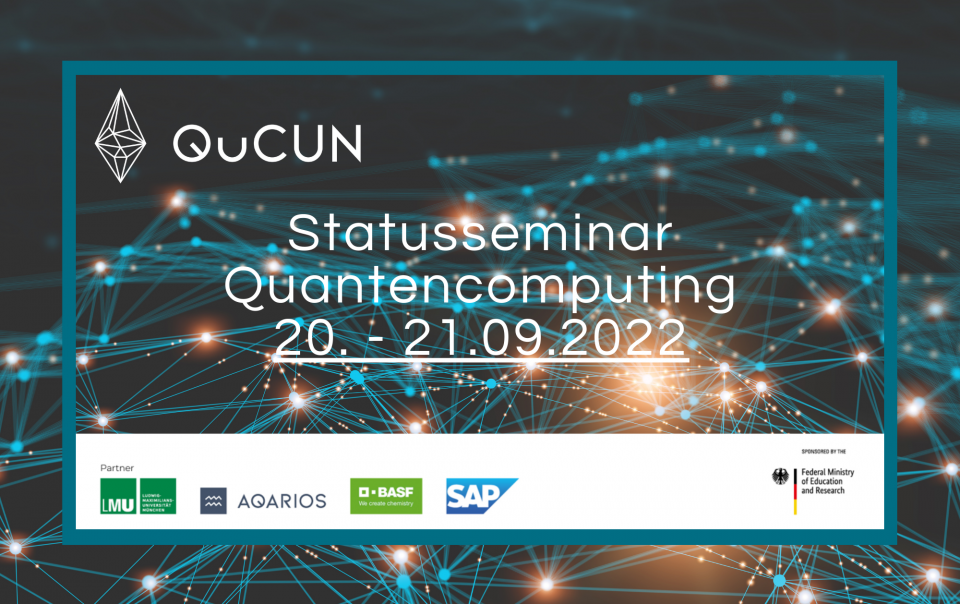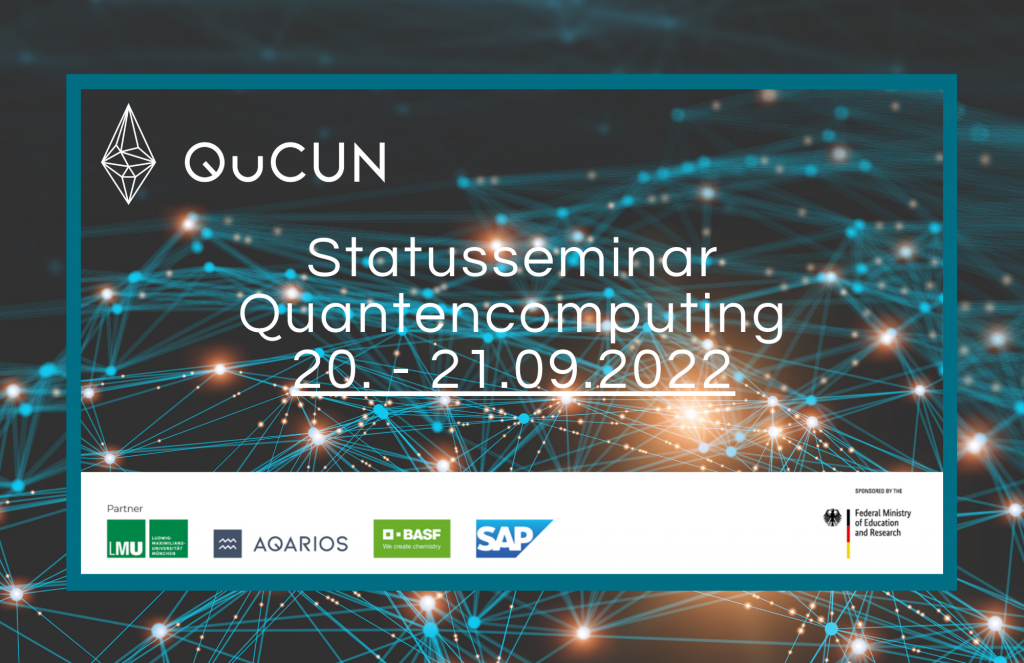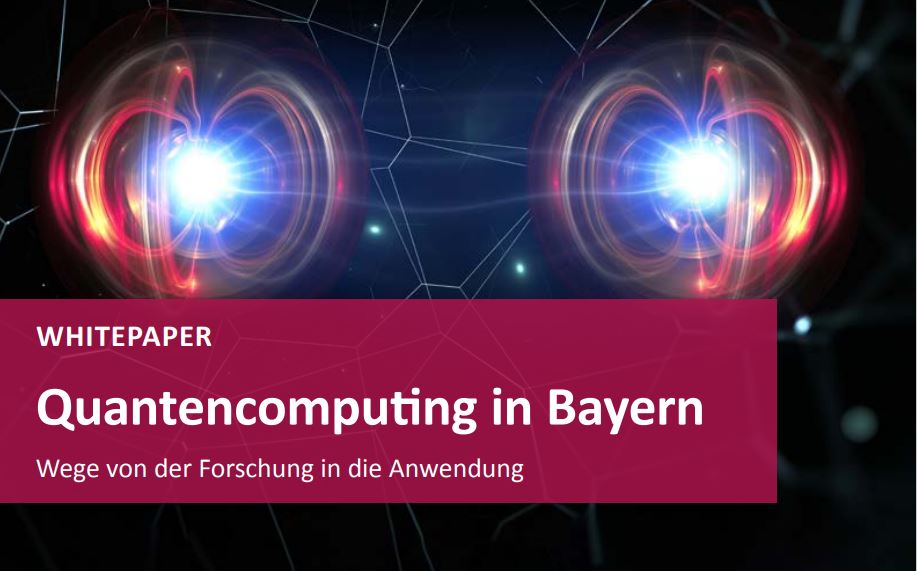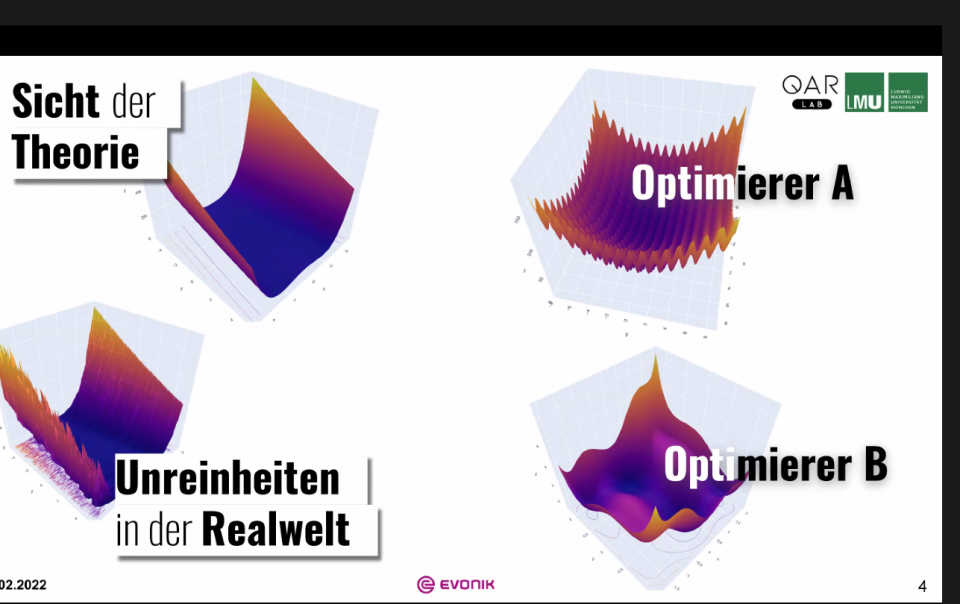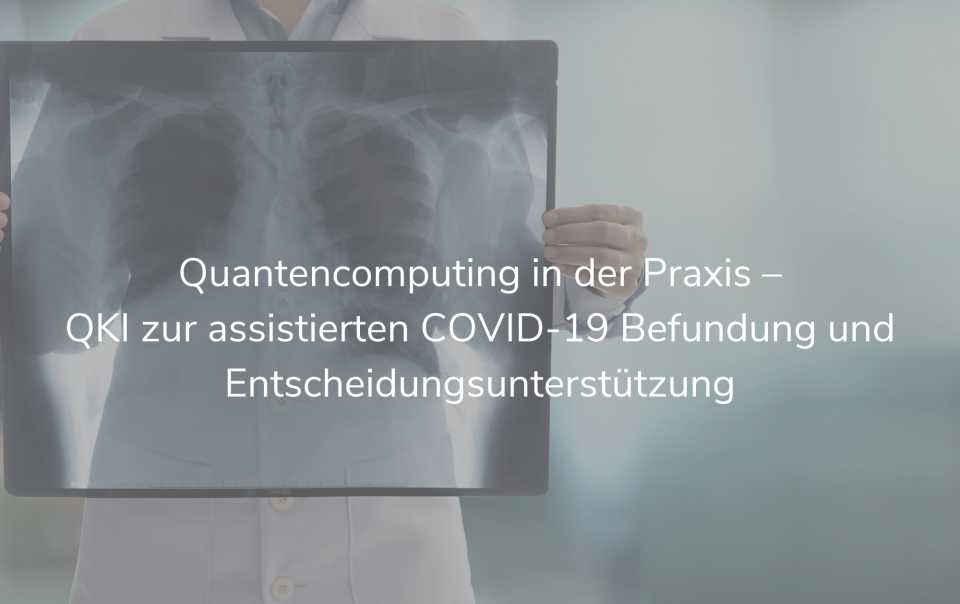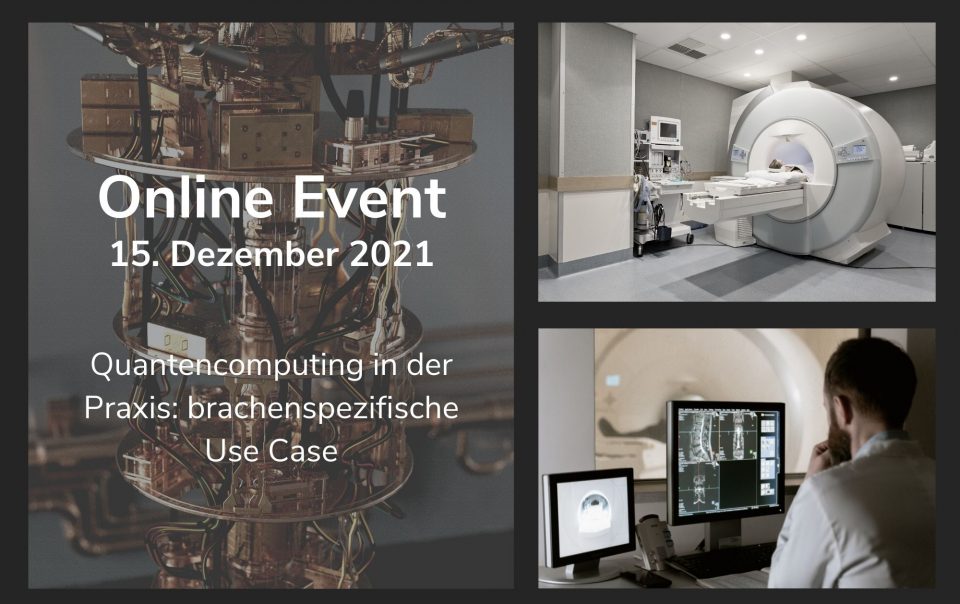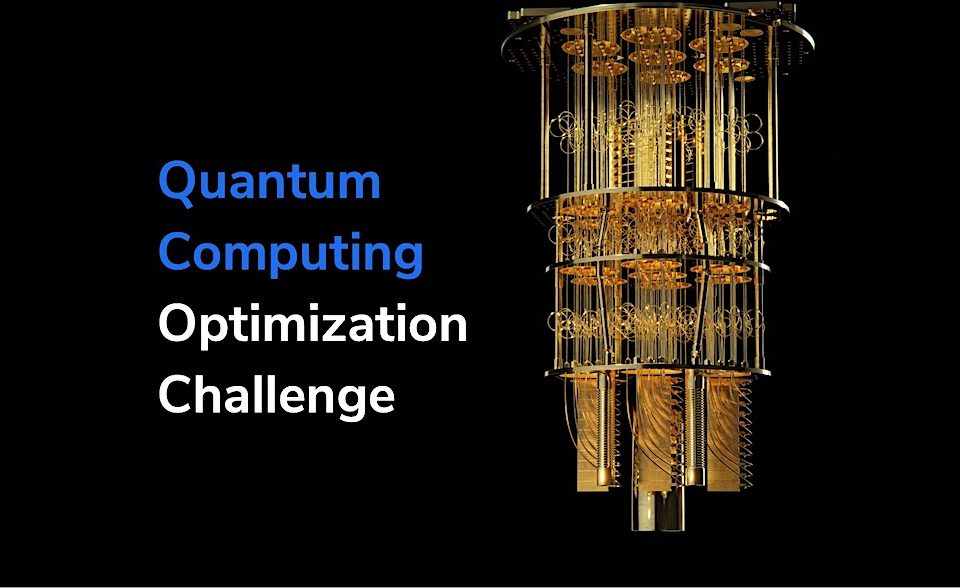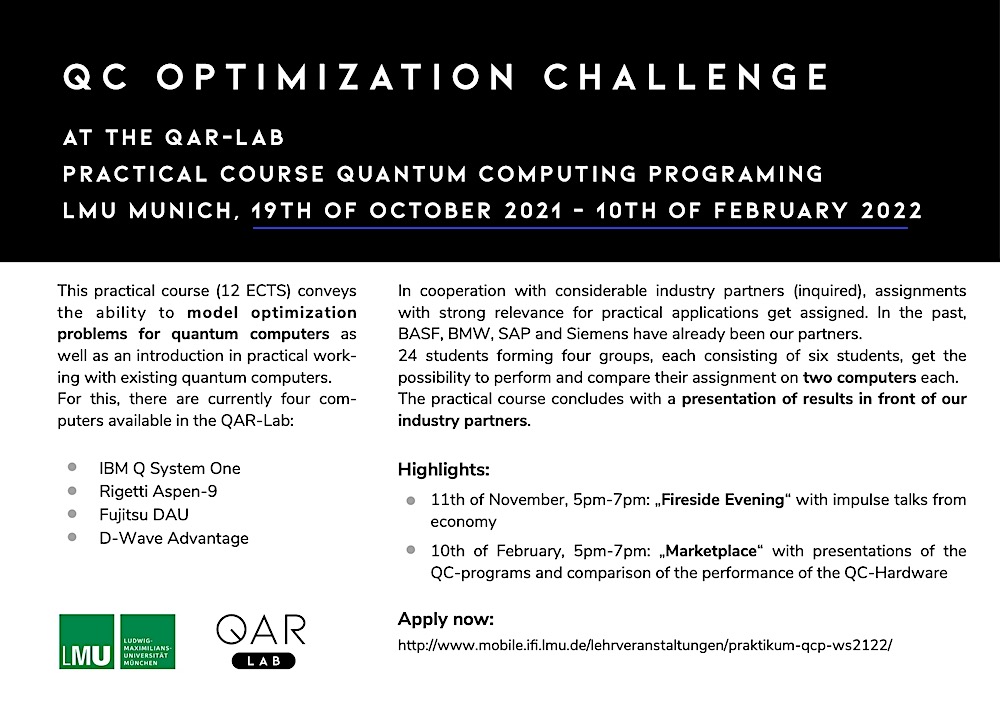QAR-Lab-EN
How Germany wants to catch up in quantum technology

(July 24, 2022/Munich) “When the quantum advantage is achieved, the technology will disruptively change the market“, commented Claudia Linnhoff-Popien, head of QAR-Lab at LMU Munich. Completely new approaches would be possible in material research, logistics, medical technology and the training of neural networks.
As a consequence, „the German economy has to prepare for the age of quantum computing”, says Claudia Linnhoff-Popien.
For this purpose the project QuCUN was founded: Ludwig-Maximilians-Universität München, in collaboration with its spin-off Aqarios and with BASF and SAP, is developing a platform that will become a central hub for companies working on quantum computers.
Read more about quantum technology in Germany in the Handelsblatt article:
www.handelsblatt.com/quantentechnologie
For more information on the QuCUN project, please visit: www.qucun.de
Quantum Computing in Bavaria
Ways from research to application
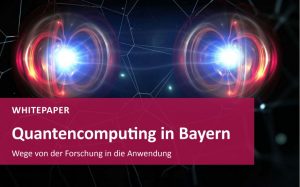 What are the advantages of quantum computing? Where are we today and what opportunities and challenges does this create? In which sectors can this pioneering technology open up new perspectives?
What are the advantages of quantum computing? Where are we today and what opportunities and challenges does this create? In which sectors can this pioneering technology open up new perspectives?
The white paper “Quantum Computing in Bavaria – Ways from Research to Application”, published by Bayern Innovativ and the QAR-Lab, aims to raise awareness of the range of possible applications of quantum computing and to inform potential quantum users what opportunities the field of quantum technology opens up for them.
The advantages of quantum computing
Today, quantum computing is still often perceived as a theoretical, purely scientific concept. This is not surprising, because already the technical background of quantum technology is difficult to imagine for most people: Unlike in the digital world, where there are only the two states “0” and “1” for the classical bits, in quantum computing the two states can also overlap – Quantum effects such as superposition and entanglement allow quantum bits (qubits) to process a significantly higher amount of different solutions in a much shorter time. Specific results on “quantum supremacy” over conventional supercomputers were provided by researchers at Google, among others, with the development of the quantum processor “Sycamore” (53 qubits). According to the developer, this will be able to perform calculations that would take a conventional supercomputer approximately 10,000 years to complete in 200 seconds.
But according to a potential analysis by management and technology consultants Sopra Steria, only 34 percent of the 158 surveyed managers and specialists from companies currently see quantum technologies as very or quite relevant for their own industry; for their own company or administration, the figure is only 28 percent. However, 64 percent of the respondents expect that quantum technologies will gain “noticeable influence” on their company or administration by 2030. After all, 59 percent of the surveyed decision-makers from the banking sector see “potential fields of application in controlling and in optimizing financial flows.” In industrial companies, 26 percent can imagine “improvements in logistics processes”. Today, comprehensive quantum strategies still exist in only a few companies – in many cases, the necessary background knowledge and an awareness of the revolutionary potential of quantum technologies are still missing.
You can download the full whitepaper for free below:
Future potentials of quantum computing for industry and economy
What will quantum computing make possible and when?
 Another day full of appointments. And of course you want to be on time. But rush hour traffic, as always, lets start the morning with a stress test of the nerves. According to the “stop and go” principle, you torture yourself with your vehicle from traffic light to traffic light. Passing road works, lane narrowing and overloaded crossings. You wonder if traffic flow through the city couldn’t be managed more smartly – but you also recognize that traffic planning professionals face an almost superhuman challenge to the complexity of urban road networks. Is there a solution anyway? Yes, in the near future. Quantum computing makes it possible …
Another day full of appointments. And of course you want to be on time. But rush hour traffic, as always, lets start the morning with a stress test of the nerves. According to the “stop and go” principle, you torture yourself with your vehicle from traffic light to traffic light. Passing road works, lane narrowing and overloaded crossings. You wonder if traffic flow through the city couldn’t be managed more smartly – but you also recognize that traffic planning professionals face an almost superhuman challenge to the complexity of urban road networks. Is there a solution anyway? Yes, in the near future. Quantum computing makes it possible …
Today, quantum computing (QC) is the topic of conversation wherever high-performance computers are involved – especially since the Bavarian Minister President Markus Söder described the technology as a “warp drive for the research of the future” [1] and the Bavarian State Government provided a total funding program of 300 million euros for QuantumTech Vision Bayern in its Hightech Agenda Plus [2]. But even today, many people still have very diffuse ideas about how quantum computers work and its potential applications – and that includes business and industry, even though the new technology could revolutionize our world in the midterm in much the same way as Konrad Zuse’s “Z1” and today’s omnipresent personal computer.
QAR-Lab: Systematic buildup of quantum expertise from the research to the user level
Our goal as QAR-Lab is to research the potential of quantum computing, to test the existing hardware and to bring quantum computing into application. Business and industry should have the most easy possible access to the new technology.
The QAR-Lab was founded in 2016 by Prof. Dr. Claudia Linnhoff-Popien at the Chair of Mobile and Distributed Systems at LMU Munich. “Our goal,” says Prof. Dr. Linnhoff-Popien, “is to conduct basic research on the one side and to make quantum technology usable for practical applications on the other side.”
Our mission at QAR Labs is to:
- to train the quantum experts of the future in research and education
- to develop an early quantum advantage in the fields of optimization and artificial intelligence for a wide range of industries with the help of quantum computing
- to enable an architecture independent programming of quantum computers by a specially developed middleware (UQO platform)
- to establish a learning platform under the name CAQAO to teach programming expertise for quantum computing
- build user expertise for quantum computing in order to make the new technology accessible to a wide range of users in industry – for example, through workshops or lectures and the identification of possible use cases
To evaluate different QC systems, we use several quantum computers and have access to computers from IBM, Fujitsu, D-Wave Systems and Rigetti via the cloud. We conduct “Challenges” with practical application scenarios, in which different hardware and programming strategies are tested to solve specific tasks.
QAR-Lab „Quantum Computing Optimization Challenge”
In spring 2021, we organized a QC Programming Challenge in the QAR Lab, in which five use cases of the companies BASF, BMW, SAP, Siemens and Trumpf were calculated on four quantum computers. The goal was to find out which computer delivers the best results for which use case. A second challenge followed in November 2021 with the companies E.ON, Evonik Industries and BAYER.
The following gate-model or annealing-based computers were used:
- IBM Q System One
- Rigetti Aspen-9
- Fujitsu DAU
- D-Wave Advantage
Before starting the experiment, the participating students from LMU Munich had to familiarize themselves with the operation of the quantum computers in an intensive way. Due to the fact that there was no standardization, this also included familiarization with the various software development kits (SDKs) for the individual computers.
Making quantum computing usable for non-specialists as well
The aim of the challenge was, among other things, to gain insights into performance, noise and user experience when accessing the quantum computers in the context of the various use cases. Prof. Dr. Linnhoff-Popien comments: “There are no other comparable experimental projects in Germany where students can gain such comprehensive experience with programming quantum computers – the QAR-Lab is currently the leader in this field. Our goal is to make quantum computing more accessible and widely commercially usable, even for non-specialists, to give companies and institutions an early quantum advantage.“
The challenge: Raising awareness of the range of possible applications
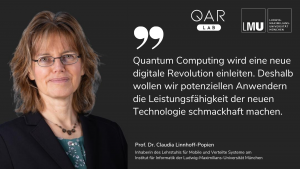 ” So far, quantum computing has been a matter for specialists who intervene very deeply in the systems with hardware-near programming,” says Prof. Dr. Linnhoff-Popien. “We currently are in a similar situation with quantum computing as we were about 50 years ago with the personal computer. And just like the PC, the quantum computer will also be operable for non-specialized users in the near future. Software developers are already looking for ways to make working with a quantum computer more intuitive. The primary task now is to raise awareness of where quantum computing can show its advantages.“
” So far, quantum computing has been a matter for specialists who intervene very deeply in the systems with hardware-near programming,” says Prof. Dr. Linnhoff-Popien. “We currently are in a similar situation with quantum computing as we were about 50 years ago with the personal computer. And just like the PC, the quantum computer will also be operable for non-specialized users in the near future. Software developers are already looking for ways to make working with a quantum computer more intuitive. The primary task now is to raise awareness of where quantum computing can show its advantages.“
The five QC levels of the QAR Lab: When will companies be able to achieve a quantum advantage?
Our QAR Lab scientists expect that companies will be able to realize their first economic quantum advantages in the next five to ten years. To evaluate where a company already stands, the individual company and its use cases are classified according to the QAR Lab model of five QC levels. In this way, it is possible to gradually identify the need for specific use cases and the expected timeframe for achieving the quantum advantage:
QC-Level 0 (Thinking)
There is an awareness that quantum computing could significantly increase performance and efficiency for certain processes.
QC-Level 1 (Classification)
There is an awareness that economic advantage can be achieved with QC in the areas of optimization, simulation, and artificial intelligence.
QC-Level 2 (Discovery)
The company has already collected a list of potential use cases for QC.
QC-Level 3 (Selection)
According to the QAR Lab’s four categories (severe, important, appropriate, and early use cases), the potential use cases are weighted and a favorite is determined.
QC-Level 4 (Implementation)
The favorite use case is implemented on several different quantum computers. Then, the results are compared with each other in terms of runtime and quality of the solution..
QC-Level 5 (Prediction)
After evaluating the comparison of different QC systems and determining the qubit requirements, our QAR Lab experts predict when the necessary hardware will be available and an early quantum advantage can be achieved.
Who can benefit from quantum computing?
In the future, quantum computing will have an impact on almost all economic and industrial sectors as well as social areas and will make a significant contribution to efficiently solving the most complex processes, such as the urban traffic planning scenario described at the beginning of this article. For many companies and institutions it is already possible today to position themselves for an early quantum advantage – and the QAR Lab is working on this:
- Identification of applications and use cases
In which application areas for a specific industry can quantum technology be used to solve complex tasks and achieve real competitive advantages? - Implementation of quantum computing solutions
Together with the company or institution, we develop solution methods for specific tasks on the basis of quantum technology. In the process, the partners get to know and understand quantum algorithms. - Choice of the appropriate quantum hardware
Not every quantum computer is equally well-suited for a specific task. We keep close partnerships with well-known producers of quantum hardware. On three quantum computers and a quantum-inspired annealer, we test the performance of computer architectures to research the best possible results for specific use cases.
Specific use cases: In which sectors will quantum computing revolutionize our world in the future?
Quantum computing is of interest for all applications where our current computers are reaching the limits of their capabilities. In research, we are currently focusing on the following topics
- Optimization
- Quantum supported artificial intelligence
A typical use case where quantum computing proves to be extremely powerful is in solutions that require an enormous amount of calculations due to the many parameters that need to be considered.
Quantum pilot project at Volkswagen AG
Volkswagen AG, for example, already launched the world’s first quantum pilot project for optimizing traffic flow (Capacitated Vehicle Routing Problem) in Lisbon in 2019: Nine vehicles in the city’s MAN bus fleet were integrated into a QC system based on a quantum computer from D-Wave. The idea was to detect traffic jams and disruptions in time and choose the fastest route to the destination almost in real time [3]. In another project, Volkswagen succeeded in using quantum computing to significantly shorten the travel times of 10,000 cabs in traffic in the Chinese mega-metropolis of Beijing [4]. So quantum computing is an application that promises enormous benefits not only for metropolitan transportation planners, but also for the logistics, transportation, and travel sectors in general.
Quantum computing in the automotive sector at the BMW Group
The BMW Group is also exploring the possibilities of quantum computing in the automotive sector and set up a challenge with four focal points with the involvement of the global quantum computing community in the summer of 2021 [5]:
- Optimization of sensor positions for automated driving functions
- Simulation of material deformations in the production process
- Optimizing the configuration of pre-production vehicles
- Machine learning for automated quality analysis
Particularly interesting in the environment of industrial production: optimizing the positions and paths of robotic arms along production lines, as well as new possibilities for automated quality control and predictive maintenance.
The other potential applications of quantum computing range from imaging processes in medical technology and the chemical and pharmaceutical industries to data protection solutions and cryptography or systems for high-precision metrological recording of electric, magnetic and gravitational fields, seismic vibrations or changes in velocity. Even stock portfolios can be optimized to maximize profits using quantum computing.
Innovations need partners: Politicians have recognized the future potential of quantum technology
Anyone who wants to advance quantum computing needs strong partners not only in research and industry, but also driving forces in politics.
In January 2021, the Bavarian state government announced the merger of the five major players in the Munich quantum scene to form the Munich Quantum Valley initiative. The Bavarian Academy of Sciences and Humanities, the Fraunhofer-Gesellschaft, the Max Planck Society, the Ludwig Maximilian University of Munich and the Technical University of Munich are members of the association. The purpose is to expand Bavaria’s leading position in the field of quantum technology research, not only in relation to the other German states, but also in relation to international high-tech nations such as the USA and China.
In a five-point future plan [6], the Bavarian state government also aims to give additional impulse to quantum technology by promoting start-ups and cross-industry innovations.
The QuantumTech Vision Bavaria, whose framework was defined by Bavaria’s Digital Minister Judith Gerlach, Economics Minister Hubert Aiwanger, and representatives of universities, research institutions, and industry, plays an essential role in this context: The intention is to implement the extensive findings from Bavarian basic research into quantum technology directly into industrial value creation.
The QAR Lab and Bayern Innovativ: Efficiently implementing technological change with quantum computing
As LMU’s QAR Lab, we focus on basic research, user expertise education, and on identifying concrete use cases together with partners from industry and business. Our partner Bayern Innovativ also wants to implement quantum computing as a future technology with concrete applications as quickly as possible. Dr. Andreas Böhm, Technology Project Manager and Head of Quantum Technology at Bayern Innovativ, commented: „We have seen in digitalization that many companies put off important innovations and transformation steps until an emergency situation such as the Corona pandemic forces them to act. We should avoid this mistake with quantum technology and take action in time. Because other states are at a similar stage of research as we are in Bavaria, but are already taking a much more application-oriented approach to this subject.“
Start with quantum computing
Read more about our cooperations with industry and about possible application possibilities in the field of quantum computing.
[1] https://www.stmwk.bayern.de/allgemein/meldung/6629/quantum-integration-centre-in-garching-soll-bayern-als-fuehrenden-standort-beim-quantencomputing-etablieren.html
[2] https://www.munich-startup.de/78011/quantentech-vision-bayern-vorgestellt/
[3] https://www.volkswagenag.com/de/news/2019/10/volkswagen-optimizes-traffic-flow-with-quantum-computers.html
[4] https://www.volkswagen-newsroom.com/de/pressemitteilungen/forschungsprojekt-erfolgreich-volkswagen-it-experten-nutzen-quantencomputer-fuer-verkehrsfluss-optimierung-1303
[5]https://www.press.bmwgroup.com/deutschland/article/detail/T0337884DE/quantencomputing:-bmw-group-startet-crowd-innovation-initiative-quantum-computing-challenge-in-zusammenarbeit-mit-aws?language=de
[6] https://www.bayern.de/bericht-aus-der-kabinettssitzung-vom-14-september-2020/
QAR-Lab presents results of the 2nd Challenge "Quantum Computing Optimization": Larger problems solvable, Industry partners satisfied
(February 10, 2022/Munich) The Quantum Application & Research Lab (QAR-Lab) at LMU’s Institute of Computer Science continues to bring Quantum Computing into application and has presented new findings. In November 2021, the second challenge “Quantum Computing Optimization” had started, and on February 10, 2022, 24 students of computer science presented the results to industrial partners. Head of QAR Lab Prof. Dr. Claudia Linnhoff-Popien was pleased with the findings from the LMU project, which lasted several months and partnered with Bayer, E.on and Evonik Industries. The students had executed one use case of each company on three quantum computers and one quantum-inspired computer. 43 people participated in the virtual presentation, some of the results are still confidential.
Prof. Dr. Claudia Linnhoff-Popien, head of QAR-Lab at LMU thanked the students for their work and the business partners for their intensive participation. The QAR-Lab, founded in 2016, pursues the goal of making quantum computing accessible to a broad user group in research and industry. A great deal of progress is being made toward this goal.
For the “Optimization Challenge,” the companies BAYER, E.on and Evonik Industries had provided practical application cases. The computer science students were asked to run the various optimization scenarios on the quantum computers of D-Wave, Fujitsu, IBM and Rigetti. The goal was to program the use cases on these computers in order to find out by comparison which hardware provides the most optimal result for the respective problem.
The use case of the energy company E.ON involved the optimization of personnel planning in the call center. Evonik Industries’ problem was a “general purpose optimizer” and the use case of the chemistry and pharmaceutical company BAYER dealt with optimizing a supply chain in agriculture.
QAR-Lab scientist Jonas Stein had organized the event and started by explaining the quantum mechanical model and the currently existing quantum hardware. The bottom line, he said, is: How do you get to the ground state of a physical system, because that encodes the solution to the optimization problem.
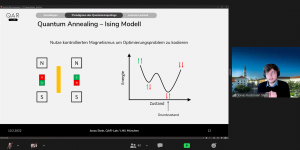
In the main part of the evening, the three student teams each presented their results:
– In the use case of the energy company E.on, a pure combinatorial optimization was performed. The task was the optimization of personnel planning in the call center. Here, the test runs yielded good results, and the industrial problem was overall well suited for quantum approaches. A program with a graphical user interface was developed to enable the low-threshold use of quantum computing in practice.
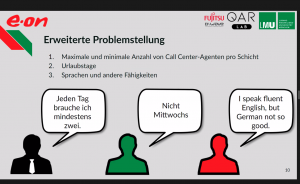
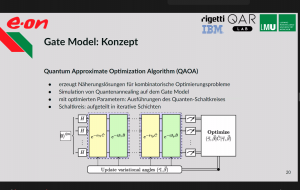
- In the use case of the company Evonik Industries promising solutions were feasible up to a certain accuracy.
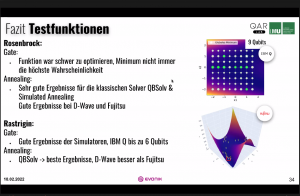
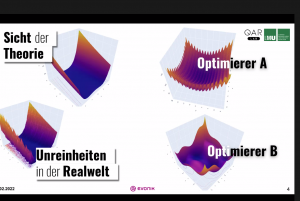
– The use of the BAYER group considered the optimization of agricultural seeds production. The use case was more complex in calculation than the other two use cases and presented the students with some hurdles.
Conclusion: Gradually larger problems solvable
Compared to the first challenge in Summer 2021, larger problems were now solvable thanks to new hardware. However, accessing the hardware has continued to be difficult or error-prone on the software side. The Annealing model continued to deliver better results than the Gate model, with the coding at Fujitsu working better in some cases and at D-Wave’s computer in others. The result is a proof-of-concept hardware implementation for combinatorial and continuous optimization problems with the new insights for optimized problem formulation.
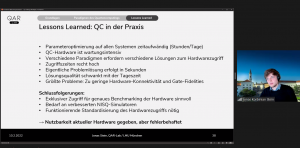
Participants satisfied with the three months Challenge
At the end of the evening the industry representatives thanked the organizers and students for their weeks of effort in the „Quantum Computing Optimization Challenge“. A lot of time and money obviously had gone into these ‚learnings‘, and the university’s commitment was greatly appreciated.
Dr. Ulf Hengstmann, Digital Transformation Lead R&D at BAYER was positive about the first results. He said they were aware that the systems were still prone to errors “in these early days of technology development. Nevertheless, they are already providing important initial findings. It is an exciting development, he said.
Computer science student Jonas Blenninger was enthusiastic about the three-month programming work: “I found the programming of the quantum computers for a real industrial use case challenging and very motivating. The internship was incredibly fun and I learned an extreme amount during these months.”
Computer science student Lennart Rietdorf was also excited about the hands-on application offered by the computer science department: “The quantum computing internship was very instructive and interesting. Because of the group work, the team members can complement each other’s strengths. I also appreciated the almost always available, very motivated scientist team of the QAR Lab, as well as the extremely quick grade announcement directly after the final lecture.”
Chair PhD scientist Jonas Stein, supervisor of the challenge, concluded: “For the use cases from the areas of production, service and product development, the students were able to successfully develop innovative quantum computing solution approaches and test them on real quantum hardware. In particular, they were able to demonstrate a proof of concept for solving continuous (rather than the usual combinatorial) optimization problems using quantum computing. It was a lot of fun for me as well.”
The Challenge serves to promote science-to-practice transfer. The results will be processed in scientific publications in 2022.
Quantum computing in practice - QKI for assisted COVID-19 reporting
and decision support
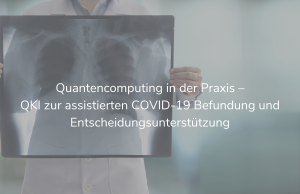 (December 15, 2021/Munich) At today’s network conference with the topic “Quantum computing in practice: industry-specific use cases”, Dr. Sigrid Auweter from Smart Reporting GmbH and Leo Sünkel from QAR-Lab were guests at Bayern Innovativ. The use of AI and quantum computing creates new possibilities in a wide variety of application areas – including the medical field. Smart Reporting GmbH has the goal of optimizing radiological diagnostic procedures and their reporting. For this purpose, Smart Reporting GmbH, together with the Fraunhofer Institute and the QAR-Lab of LMU Munich, are working on the use case “QKI-supported diagnosis of COVID-19 in radiology images” as part of the PlanQK project. The basic idea is to use quantum computing to analyze radiological diagnostic data and images of the lungs and surrounding organs in relation to the diagnosis of Covid-19.
(December 15, 2021/Munich) At today’s network conference with the topic “Quantum computing in practice: industry-specific use cases”, Dr. Sigrid Auweter from Smart Reporting GmbH and Leo Sünkel from QAR-Lab were guests at Bayern Innovativ. The use of AI and quantum computing creates new possibilities in a wide variety of application areas – including the medical field. Smart Reporting GmbH has the goal of optimizing radiological diagnostic procedures and their reporting. For this purpose, Smart Reporting GmbH, together with the Fraunhofer Institute and the QAR-Lab of LMU Munich, are working on the use case “QKI-supported diagnosis of COVID-19 in radiology images” as part of the PlanQK project. The basic idea is to use quantum computing to analyze radiological diagnostic data and images of the lungs and surrounding organs in relation to the diagnosis of Covid-19.
The goal of this use case is to automatically classify lung CT images into three categories: Healthy, COVID 19 pneumonia, and other diagnosis. In addition, the severity in COVID19 pneumonia is determined, i.e., how intensely the lungs have been attacked by COVID19. Based on this, the best treatment option for the patient should subsequently be derived. With the help of Quantum Machine Learning, the entire process will be optimized.
„First of all, the goal is to search and identify different solution approaches – especially related to quantum computers of the next years respectively the NISQ era.”
Quote Leo Sünkel/QAR-Lab
Several prototypes already exist that can be used to implement the project. One approach lies in hybrid classical “quantum transfer learning” with final localization of the image regions most likely to indicate pathology. This is performed on the quantum gate model. Another solution approach runs on the Quantum Boltzmann Machine which is calculated using quantum annealers.
One of the current challenges is that present quantum computers with the small number of qubits are not yet suitable to process whole CT scans on their own. For this reason, the hybrid approach is currently being forced, in which classical computers work together with quantum computers to do calculations and different architectures are being experimented with. The long-term goal is to maximize the quantum component and so achieve better results.
In the further course of the project, the various architectures will be evaluated and assessed. What are the weaknesses of the used quantum models and how good are the obtained results? On this basis, the models can be improved and extended. In addition, the newest medical findings from the COVID19 pandemic research are continuously integrated into the project.
If the use case “QKI-assisted diagnosis of COVID-19 in radiology images” succeeds in obtaining meaningful diagnoses, QKI methods can also be applied to other disease patterns in the long term and be a significant support to the healthcare sector.
Merck to Lead BAIQO Quantum Computing Project Funded by the German Federal Ministry of Education and Research – QAR-Lab at LMU will be their partner
• The QAR-Lab at Ludwig-Maximilians University in Munich, Germany, is a partner in this joint project
• Partners want to use quantum computing models to optimize clinical studies
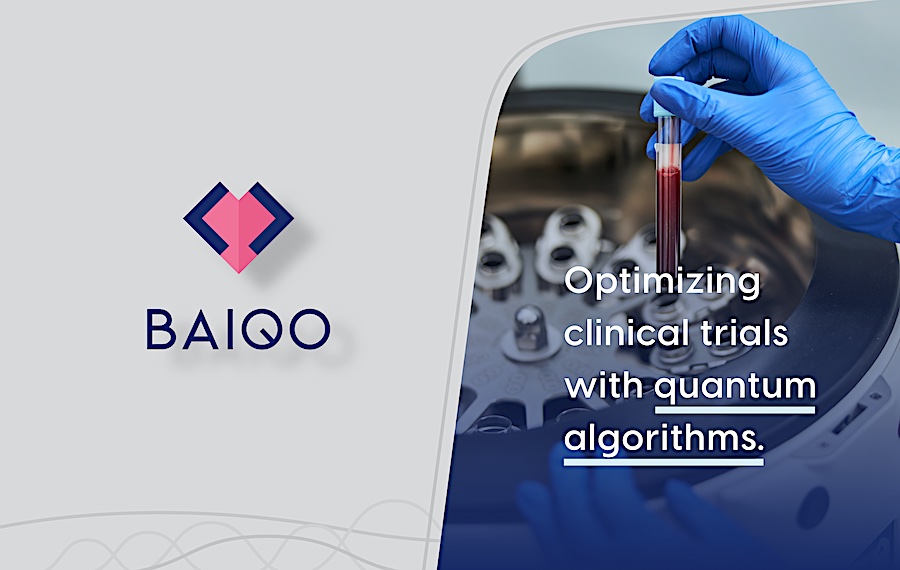 (Darmstadt und Munich – Germany, December 9, 2021)
(Darmstadt und Munich – Germany, December 9, 2021)
Merck, a leading science and technology company, today announced its membership of the research project BAIQO (Bayesian Network Analysis and Inference via Quantum-assisted Optimization), which is being funded by the German Federal Ministry of Education and Research (BMBF). This three-year project will be carried out in collaboration with the Quantum Applications & Research Laboratory (QAR-Lab) at Ludwig-Maximilians University in Munich (LMU), Germany. This research project focuses on creating a basis for the use of quantum computing in the modeling of clinical studies. Together, the partners will investigate the potentials of various quantum algorithms for optimizing models generated with the aid of machine learning from large data sets.
“The algorithms are to be integrated into our existing optimization platform and investigated. Together, we are approaching the topic of how drug candidates can move through clinical development more purposefully, more quickly, more safely, and of course, more sustainably,” said Thomas Ehmer, project manager on the Merck side. “Of course, BAIQO offers the potential for new innovative jobs in this technology field.”
Informatics Professor and Institute Chair Claudia Linnhoff-Popien, who heads the QAR-Lab at LMU, is convinced by the BAIQO project: “We at the QAR-Lab see enormous application potential for quantum computing in the optimization of clinical trials. With our many years of expertise in the areas of artificial intelligence and quantum computing, we want to support Merck in the development and implementation of beneficial algorithms.”
Machine-derived models for clinical studies (known as Bayesian models) are often highly complex, with a very large number of variables and dependencies between those variables. The research partners want to evaluate the extent to which these kinds of models can generally be translated into optimization problems to define the best possible parameter distribution for modeling successful clinical trials.
A further question that the BAIQO project aims to answer is the extent to which different kinds of quantum algorithms can be applied under the existing limitations of current quantum computing hardware, i.e. so-called NISQ devices (NISQ: noisy intermediate-scale quantum). The evaluation of currently available NISQ devices will also clarify whether a “quantum advantage” exists compared with classic approaches for optimizing clinical trials.
The BMBF will fund 73.3% of the € 1.5 million project volume via the “Application Network for Quantum Computing” funding announcement, a measure for implementing the government program “Quantum Technologies – From basic research to market”.
Online Event December 15, 2021
Quantum computing in practice: specific use cases in industry
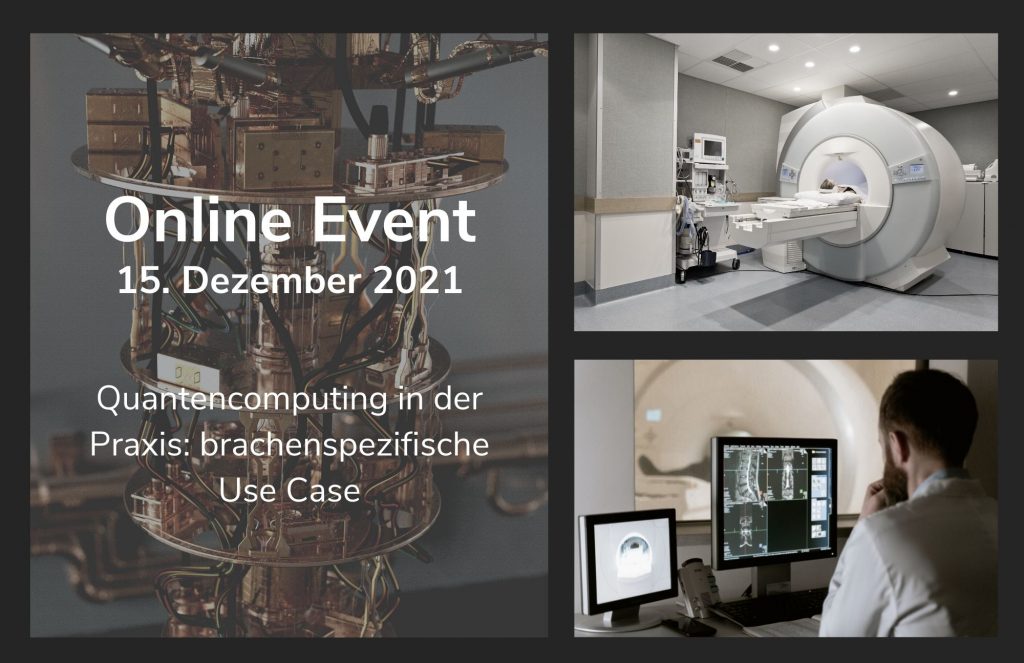
On December 15, our partner Bayern Innovativ will bring together experts to promote an exchange of knowledge in the field of quantum computing. Branch-specific use cases are to show in which areas the technology can be applied. QAR-Lab will also present a use case with one of its partners, the Smart Reporting GmbH.
Smart Reporting GmbH has recently developed SmartCAD | COVID-19, a system for AI-supported radiological diagnosis and standardized reporting of COVID-19. This system can be significantly improved with methods of QKI and will be additionally supplemented with a QKI-based decision support in the PlanQK project.
The presentation “QKI-supported diagnosis of COVID-19 in radiology images” by Leo Sünkel – PhD student at the Chair of Mobile and Distributed Systems of the QAR Lab, LMU Munich – and by Dr. Sigrid Auweter – VP Research & Innovation, Smart Reporting GmbH, Munich – can be auditioned at 11:10 a.m..
5 - 7 October 2021: Prof. Linnhoff-Popien gives talk at Energy Innovation Days 2021

Innovation is the key driver of the energy transition; it is accelerating the move toward a more connected and sustainable world. But what will this future look like – and how do we get there?
These questions will be discussed at E.ON’s three-day virtual Energy Innovation Days conference. This event is one of the largest energy innovation events in Europe and brings together experts from around the world to discuss and share their perspectives on the transition to a carbon-neutral world.
November 11, 2021 | 5pm - 7pm Fireplace chat as part of the QC Optimization Challenge at the QAR-Lab
Fireplace chat as part of the QC Optimization Challenge at the QAR-Lab
This practical course (12 ECTS) conveys the ability to model optimization problems for quantum computers, as well as an introduction in practical work- ing with existing quantum computers. For this, there are currently four com- puters available in the QAR-Lab:
- IBM Q System One
- Rigetti Aspen-9
- Fujitsu DAU
- D-Wave Advantage
In cooperation with Bayer, E.ON und Evonic, assignments with strong relevance for practical applications get assigned. In the past, BASF, BMW, SAP and Siemens have already been our partners.
24 students forming four groups, each consisting of six students, get the possibility to perform and compare their assignment on two computers each. The practical course concludes with a presentation of results in front of our industry partners.

